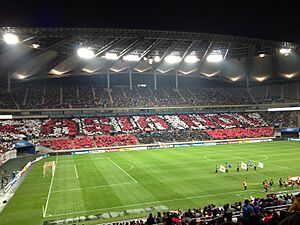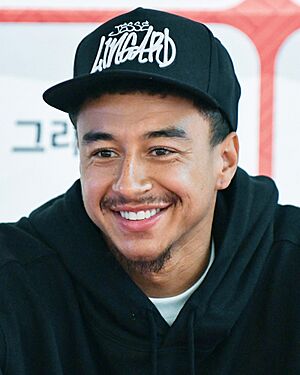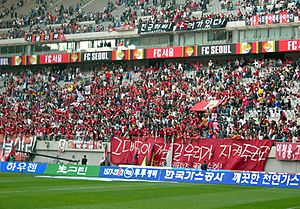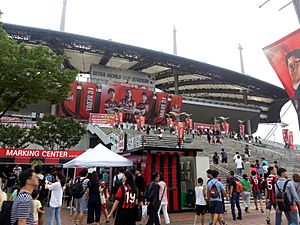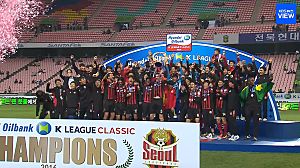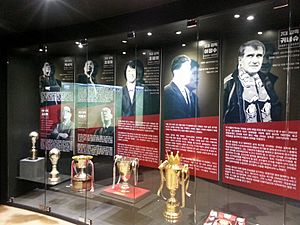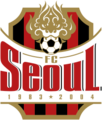FC Seoul facts for kids
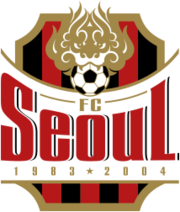 |
|||
| Full name | Football Club Seoul | ||
|---|---|---|---|
| Nickname(s) | 검붉은 전사 (Dark Red Warriors) | ||
| Founded | December 22, 1983 (as Lucky-Goldstar FC) | ||
| Ground | Seoul World Cup Stadium | ||
| Capacity | 66,704 | ||
| Owner | GS Group | ||
| Chairman | Huh Tae-soo | ||
| Manager | Kim Gi-dong | ||
| League | K League 1 | ||
| 2024 | K League 1, 4th of 12 | ||
|
|
|||
FC Seoul (Korean: FC 서울) is a professional football club from Seoul, South Korea. They play in the K League 1, which is the top football league in South Korea. The club is owned by GS Sports, a part of the GS Group. Since 2004, FC Seoul has played its home games at the Seoul World Cup Stadium in Seoul.
The club started as Lucky-Goldstar Football Club in 1983. It was founded by the Lucky-Goldstar Group. Later, in 1990, it was renamed LG Cheetahs. The club had to move to Anyang for eight years due to a league rule. They returned to Seoul in 2004. FC Seoul has won many titles, including six K League championships. They also won two FA Cups, two League Cups, and one Super Cup. In international games, they reached the AFC Champions League final twice.
FC Seoul is one of the most successful and popular clubs in the K League 1. They have strong support from the GS Group. In 2012, they were named the most valuable football brand in the K League. Their biggest rivals are Suwon Samsung Bluewings. Their matches against them are called the Super Match.
Contents
Club History
How it Started (1983–1989)
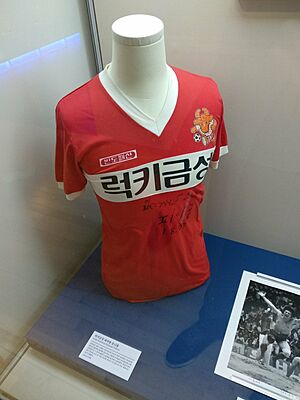
FC Seoul officially started on December 22, 1983. It was first called Lucky-Goldstar Hwangso Football Club. The Lucky-Goldstar Group owned and supported the team. It was the fifth professional football team in South Korea. Their first home area was Chungcheong Province, and their mascot was a bull.
In the 1984 season, the team finished seventh. But in the 1985 season, they won the league title! This was thanks to Thai player Piyapong Pue-on. He was the top scorer and also gave the most assists that season.
Moving Around (1990–2003)
In 1988, Lucky-Goldstar Hwangso wanted to move to Seoul. By the end of 1989, the K League invited some clubs to play in Seoul. So, Lucky-Goldstar Hwangso moved to Seoul Stadium (now Dongdaemun Stadium). They won the championship in their first season in Seoul.
In 1991, the club changed its name to LG Cheetahs. This was like the LG Twins, a baseball team also owned by LG Group. In 1996, the club had to move again. This was because of a K League rule to help football grow in other parts of the country. Also, Korea was hoping to host the 2002 FIFA World Cup. New stadiums were needed, including one in Seoul. The government told the Seoul clubs they could return if they built a special football stadium in Seoul.
So, LG Cheetahs moved to Anyang Sports Complex in Anyang. This city is about 21 km from Seoul. The team was then called Anyang LG Cheetahs. They gained many fans there and started a big rivalry with Suwon Samsung Bluewings. This rivalry was also strong because LG Group and Samsung Group (who owned Suwon) were business rivals. In 2000, the club won its third championship.
Back to Seoul (2004–2006)
For the 2002 FIFA World Cup, South Korea built ten new stadiums. After the World Cup, the football associations wanted K League clubs to use these stadiums. The Seoul World Cup Stadium was empty. So, the city of Seoul and the KFA wanted a club to play there. Anyang LG Cheetahs, with LG Group's support, decided to move back to Seoul. They had the right to return because they were forced to move in 1996.
In February 2004, Anyang LG announced they would pay for part of the stadium's building costs. This move caused some debate among fans. But the KFA allowed the move. The club was renamed FC Seoul.
Şenol Güneş Era (2007–2009)
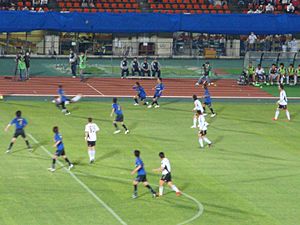
Şenol Güneş became FC Seoul's manager on December 8, 2006. In the 2007 season, they started strong. They even beat their rivals Suwon Samsung Bluewings 4–1. FC Seoul reached the final of the 2007 Korean League Cup. Before the next season, star player Park Chu-young moved to a French club.
FC Seoul finished second in the 2008 regular season. They reached the play-offs but lost to Suwon Samsung Bluewings in the final. Still, they qualified for the 2009 AFC Champions League. In that season, Dejan Damjanović scored 15 goals. FC Seoul did well in the AFC Champions League. They beat Kashima Antlers in a penalty shootout to reach the quarter-finals. They were then beaten by Umm Salal from Qatar. Şenol Güneş left the club in November 2009.
Winning the Double (2010)
Nelo Vingada became FC Seoul's manager on December 14, 2009. In 2010, Vingada led FC Seoul to win both the K League and the League Cup. This was called a "double". They won 20 games, drew 2, and lost 6 in the league.
On May 5, 2010, FC Seoul had 60,747 fans at a game against Seongnam Ilhwa. This was the highest number of fans for a single professional sports game in South Korea's history. They also had the highest total attendance for a season. On August 25, 2010, FC Seoul won the League Cup. They also won the K League championship by beating Jeju United. Vingada left the club in December 2010.
AFC Champions League Final and Sixth Title (2011–2016)
Former FC Seoul player Choi Yong-soo became the manager in 2012. In 2013, FC Seoul reached the AFC Champions League final. They lost to Chinese team Guangzhou Evergrande on away goals. Choi Yong-soo won the 2013 AFC Coach of the Year award for his work. He left the club in June 2016.
On June 21, 2016, Hwang Sun-hong became the new manager. On November 6, 2016, FC Seoul won their sixth K League title. They beat Jeonbuk Hyundai Motors 1–0 in the last game of the season.
Recent Years (2017–present)
Hwang Sun-hong resigned in April 2018. In the 2018 season, FC Seoul finished 11th. They had to play in the K League promotion-relegation playoffs for the first time. They won against Busan IPark and stayed in the top league.
On October 11, 2018, Choi Yong-soo returned as manager. In the 2020 season, FC Seoul lost five games in a row. This had not happened in 22 years. Choi Yong-soo left, and several temporary managers took over. The team finished ninth. A sad event happened when defender Kim Nam-chun passed away on October 30, 2020.
In the 2024 K League 1 season, the club had many fans at their games. This was partly because the league was growing and because they signed Jesse Lingard. FC Seoul finished in the top half of the K League 1 for the first time since 2019. They also qualified for the 2025–26 AFC Champions League Elite. Lingard was named captain for the 2025 season.
Club Culture
Supporters
FC Seoul has many different fans. Some supported the club when it was Lucky-Goldstar, LG Cheetahs, or Anyang LG Cheetahs. The club's number 12 jersey is saved for its supporters. This is because fans are seen as the "12th player." The main fan group is called Suhoshin, which means "guardian deity." It started in April 2004.
Rivalries
FC Seoul's main rivalry is with Suwon Samsung Bluewings. Their games are called the Super Match. Both teams are very successful in the Seoul area. This rivalry started when FC Seoul was in Anyang.
Other important rivalries include games against Jeonbuk Hyundai Motors (called the Jeonseol Match) and Incheon United (called the Gyeongin Derby). In May 2024, fans of Incheon threw water bottles at Seoul players during an away game.
Fans of FC Anyang feel very strongly against FC Seoul. FC Anyang is a new club that started in Anyang after LG Cheetahs moved. They want to get revenge on the field. In a 2017 cup match, Anyang fans lit flares to show their defiance. In the 2025 K League 1 season, FC Anyang will play against FC Seoul in a league match for the first time. This game is called the "Relocation Derby."
V-Girls and V-Man
V-Girls and V-Man are FC Seoul's cheerleaders. The "V" stands for victory. They cheer for the team at the East Stand of the stadium.
Stadiums and Training
Since 2004, FC Seoul's home stadium has been the Seoul World Cup Stadium. It is the biggest football-only stadium in South Korea. FC Seoul players train at the GS Champions Park training center. This facility was built in 1989 and is in Guri, east of Seoul. The club's youth academy is also based there.
In the past, FC Seoul played at several other stadiums. These included Daejeon Stadium, Cheongju Civic Stadium, Cheonan Oryong Stadium, Dongdaemun Stadium, and Anyang Stadium.
Team Symbols
FC Seoul has had different names and symbols over the years. These include Lucky-Goldstar FC (1983–1990), LG Cheetahs (1991–1995), and Anyang LG Cheetahs (1996–2003).
The club also had different mascots. In the past, they had a bull and a cheetah. The current mascot, introduced in 2004, is named "SSID." SSID stands for Seoul & Sun In Dream. In the 2018 season, another mascot named "Seoul-i" was added. The current club symbol has been used since 2004.
Team Kits
FC Seoul's home kits have red and black stripes, just like their club symbol.
In 1984 and 1985, FC Seoul wore both red and yellow kits for home games. From 1988 to 1994, the main color of their home shirt was yellow. This was the same as the Lucky-Goldstar Group's company color. In 1995, the company changed its main color to red. So, FC Seoul's jersey also changed from yellow to red.
From 1999 to 2001, FC Seoul wore red and blue stripes. They went back to all red in 2002. In 2005, FC Seoul changed to red and black stripes, which they still use today. In June 2016, FC Seoul released a retro jersey from 1984–1985. This was to celebrate the club's founding and first K League title.
Home Kit History
|
|
|
|
|
|
|
Kit Sponsors
FC Seoul has had different companies making their kits and sponsoring their shirts. Early on, Bando Fashion and Pro-Specs made their kits. Lucky-Goldstar and GoldStar were early sponsors. Later, Reebok and Adidas became kit suppliers. Since 2012, Le Coq Sportif and more recently Pro-Specs have supplied the kits. Shirt sponsors have included various LG Group brands like LG Electronics and LG Telecom. Since 2005, GS Group companies like GS E&C (for their Xi apartments) and GS Caltex (for KIXX fuel) have been major sponsors.
Players
Current Squad
|
|
Players on Loan or Military Service
|
|
Retired Jersey Numbers
FC Seoul has retired two jersey numbers to honor special parts of the club:
- 12 – This number is for the supporters. It shows that the fans are like the 12th player on the team.
- 13 – This number is retired for Go Yo-han, a long-time player who was very important to the club.
Team Captains
The captain is a very important player who leads the team. Here are some of FC Seoul's captains over the years:
| Season(s) | Captain | Vice-captain(s) |
|---|---|---|
|
|
||
|
|
||
|
|
||
| 1986–1988 | ||
| 1989–1990 | ||
| 1991–1992 | ||
|
|
||
|
|
||
|
|
||
| 1995–1996 | ||
|
|
||
|
|
||
|
|
||
| 1999–2000 | ||
|
|
||
|
|
||
|
|
||
|
|
||
| 2003–2004 | ||
| 2005–2006 | ||
| 2007–2008 | ||
|
|
||
|
|
||
|
|
||
| 2012–2013 | ||
|
|
||
| 2015 | ||
|
|
||
|
|
||
| 2018 | ||
|
|
||
|
|
||
|
|
||
| 2022 | ||
| 2023 | ||
|
|
||
|
|
Club Achievements
FC Seoul has won many important titles:
In South Korea
- K League 1
- Winners (6): 1985, 1990, 2000, 2010, 2012, 2016
- Runners-up (5): 1986, 1989, 1993, 2001, 2008
- Korean FA Cup
- Winners (2): 1998, 2015
- Runners-up (3): 2014, 2016, 2022
- Korean League Cup
- Winners (2): 2006, 2010
- Runners-up (4): 1992, 1994, 1999, 2007
- Korean Super Cup
- Winners (1): 2001
- Runners-up (1): 1999
- Korean National Football Championship
- Winners (1): 1988
International Competitions
- AFC Champions League
- Runners-up (2): 2001–02, 2013
Managerial History
FC Seoul has had many managers leading the team. Here are some of them:
| No. | Name | From | To | Notes |
|---|---|---|---|---|
|
|
1983 | 1987 | First manager of FC Seoul. | |
| C | 1987 | 1988 | Caretaker manager in 1988, then became regular manager. | |
| 2 | 1988 | 1993 | ||
| 3 | 1994 | 1996 | First manager who was a former FC Seoul player. | |
| C | 1996 | 1996 | Caretaker manager for one match. | |
| 4 | 1996 | 1998 | Won the first FA Cup for FC Seoul. | |
| 5 | 1998 | 2004 | The club's longest serving manager (six seasons). | |
| 6 | 2004 | 2006 | Won the first League Cup for FC Seoul. | |
| 7 | 2006 | 2009 | First foreign manager of FC Seoul. | |
| 8 | 2009 | 2010 | First (and only) manager to win the double. | |
| 9 | 2010 | 2011 | ||
| C | 2011 | 2011 | Caretaker manager in 2011, then became regular manager. | |
| 10 | 2011 | 2016 | First manager to win K League as both a player and a manager. | |
| C | 2016 | 2016 | Caretaker manager for one match. | |
| 11 | 2016 | 2018 | ||
| C | 2018 | 2018 | ||
| 12 | 2018 | 2020 | First manager to be appointed twice. | |
| C | 2020 | 2020 | ||
| C | 2020 | 2020 | ||
| C | 2020 | 2020 | ||
| 13 | 2020 | 2021 | ||
| 14 | 2021 | 2023 | ||
| C | 2023 | 2023 | ||
| 15 | 2023 | Present |
Club Management
Board of Directors
These are the people who help run FC Seoul:
| Role | Name |
|---|---|
| Chairman | |
| CEO | |
| Director |
Chairmen History
The chairman is the top leader of the club's board.
| No. | Name | From | To |
|---|---|---|---|
|
|
|
|
|
|
|
|
|
|
|
|
|
|
|
|
|
|
|
Club Ownership
The ownership of FC Seoul has changed a few times, but it has always been connected to the same main group:
| Years | Owner |
|---|---|
| 1983–1991 | |
| 1991–2004 | |
| June 2004–December 2004 | |
| 2005–present |
Images for kids
See also
 In Spanish: Football Club Seoul para niños
In Spanish: Football Club Seoul para niños
 | Mary Eliza Mahoney |
 | Susie King Taylor |
 | Ida Gray |
 | Eliza Ann Grier |


